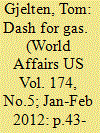|
|
|
Sort Order |
|
|
|
Items / Page
|
|
|
|
|
|
|
| Srl | Item |
| 1 |
ID:
130242


|
|
|
|
|
| Publication |
2014.
|
| Summary/Abstract |
The presidencies of George W. Bush and Barack Obama suggest what doesn't work in efforts to promote US influence in the world. By ordering an ill-conceived invasion of Iraq, Bush alienated US allies. His policies of secretly imprisoning Islamist militants and then subjecting them to "enhanced" interrogation and indefinite detention at Guantánamo struck Muslims everywhere as evidence of a war on Islam. Barack Obama, elected as the most explicitly anti-war president since Woodrow Wilson, came into office determined to undo the international damage done by his predecessor. "The walls between old allies on either side of the Atlantic cannot stand," Obama said in Berlin in 2008, and a year later, speaking in Cairo, he promised "a new beginning" with the Muslim world, with relations "based upon mutual interest and mutual respect." As promised, he withdrew US combat troops from Iraq. By 2013, however, Obama had fared little better than Bush in his global outreach. According to the Pew Research Center, support for the United States in Egypt, Jordan, Lebanon, and Pakistan was actually lower than it had been in the last year of the Bush administration. In Europe, the US favorability rating was higher than it was under Bush, but it had fallen steadily in the years since Obama took office, and it remained far below where it stood in 2000. One possible lesson from these years is that presidential personalities, speeches on foreign stages, and the changing international opinions of US policies matter less than we might think. Perhaps the most reliable measure of America's standing in the world is how appealing the country is to all those who are considering migration. Since 2007, Gallup surveys in more than one hundred and fifty countries have shown that the United States is far and away the number one favored destination. The most recent survey projected that one hundred and thirty-eight million people worldwide would like to move permanently to the United States, more than three times the number who would choose the United Kingdom, the second most favored destination. Those numbers show the United States still represents opportunity and promise to people around the world, and it is clearly in the US global interest to maintain that reputation.
|
|
|
|
|
|
|
|
|
|
|
|
|
|
|
|
| 2 |
ID:
115058


|
|
|
|
|
| Publication |
2012.
|
| Summary/Abstract |
For a fresh perspective on geopolitical trends, look at the world through the lens of the natural gas trade. One of the reasons for Israeli unease with the Arab Spring is that the democratic uprising that took down Hosni Mubarak also brought interruptions in Israel's supply of natural gas, much of which since 2008 has come from Egypt. Wondering about China's new interest in Australia and Qatar? It's about their abundant gas supplies and China's tremendous energy needs. Desperate for signs of cooperation from North Korea? Check out reports that Kim Jong-il may agree to the construction of a natural gas pipeline that would link Russia, Pyongyang, and Seoul. From Asia to the Middle East to North America, a boom in natural gas usage is rearranging international connections, with major repercussions for global politics.
|
|
|
|
|
|
|
|
|
|
|
|
|
|
|
|
| 3 |
ID:
122105


|
|
|
|
|
| Publication |
2013.
|
| Summary/Abstract |
When the Pentagon launched its much-anticipated "Strategy for Operating in Cyberspace" in July 2011, it appeared the US military was interested only in protecting its own computer networks, not in attacking anyone else's. "The thrust of the strategy is defensive," declared Deputy Secretary of Defense William Lynn. The Pentagon would not favor the use of cyberspace "for hostile purposes." Cyber war was a distant thought. "Establishing robust cyber defenses," Lynn said, "no more militarizes cyberspace than having a navy militarizes the ocean."
|
|
|
|
|
|
|
|
|
|
|
|
|
|
|
|
| 4 |
ID:
099664


|
|
|
|
|
| Publication |
2010.
|
| Summary/Abstract |
The United States and other major military powers are well prepared to fight on land, at sea, in the air, and even in space. Now, countries must consider the prospect of combat in a fifth domain: cyberspace. It's unfamiliar, and it's frightening. The attacks in 2007 and 2008 on government Web sites in Estonia and Georgia , minor though they were, focused the world's attention for the first time on the prospect that hostile militaries could inflict great damage on other countries by targeting their computers. In announcing a cybersecurity initiative nine months after the attacks in Georgia, President Obama said they offered "a glimpse of the future face of war." Researchers who have studied the new Stuxnet computer worm, capable of commanding industrial control systems, describe it as the first "cyber superweapon."
|
|
|
|
|
|
|
|
|
|
|
|
|
|
|
|
|
|
|
|
|